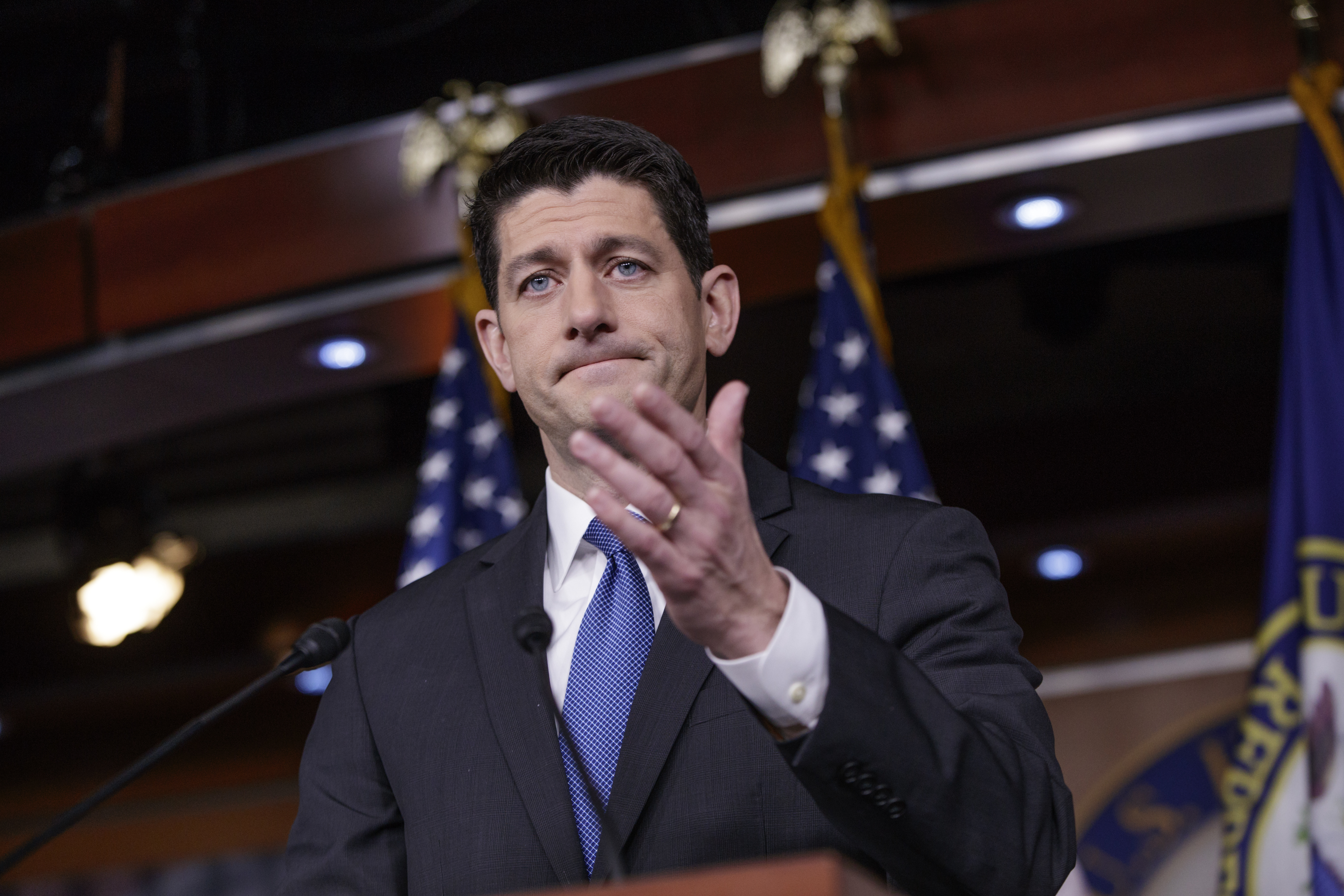Why the GOP's latest split over ObamaCare was entirely predictable
As Republicans finally begin sweating the details of a replacement plan, old philosophical fissures are reappearing


A free daily email with the biggest news stories of the day – and the best features from TheWeek.com
You are now subscribed
Your newsletter sign-up was successful
The GOP crack-up over repealing ObamaCare is deepening by the day. As Republicans finally begin sweating the details of a replacement plan, old philosophical fissures over how government should help low-income Americans are reappearing.
Republican leaders, of course, are dead set on repealing ObamaCare, but feel political pressure to avoid throwing people off of their insurance. That will require continuing to subsidize people who cannot afford insurance on their own. To that end, Speaker of the House Paul Ryan recently released an outline of a plan that would provide refundable tax credits to help people afford coverage.
This is actually very similar to how ObamaCare works. A key part of the Affordable Care Act is that it provides tax credit subsidies, called "advance refundable tax credits," to help individuals afford health insurance. These subsidies can be substantial depending on your income — for some people, the subsidies cover the entire cost of their health insurance premiums. The biggest difference between ObamaCare and Ryan's subsidies is who will receive the bulk of the credits — ObamaCare's give more to the poor; Ryan's to the elderly, irrespective of income — but the mechanism is largely the same.
The Week
Escape your echo chamber. Get the facts behind the news, plus analysis from multiple perspectives.

Sign up for The Week's Free Newsletters
From our morning news briefing to a weekly Good News Newsletter, get the best of The Week delivered directly to your inbox.
From our morning news briefing to a weekly Good News Newsletter, get the best of The Week delivered directly to your inbox.
Unsurprisingly, hard-line conservatives in Congress have rebelled against Ryan's plan. The conservatives see refundable tax credits as thinly veiled welfare — a government handout that's anathema to conservative principles of limited spending. Rep. Trent Franks (R-Ariz.) worried that a refundable tax credit for health care "can so easily become a major and unstoppable entitlement." Rep. Mark Walker (R-N.C.) fretted that the tax credit could morph into an "open-ended benefit that enables people."
Instead, these conservatives prefer a tax deduction for health insurance costs that would provide little help to those who need it most. Because a tax deduction only reduces your tax liability, it provides the most help to people who pay a lot in taxes (i.e. the rich) and the least help to those who pay relatively little (i.e. the poor).
There is a long history of conservative queasiness with tax programs that provide a net benefit to low-earners. Refundable tax credits first came into vogue as a compromise between the two parties. Democrats that wanted direct government spending programs settled for a submerged state of social spending through the tax code. Meanwhile, Republicans were able to defuse the growth of the welfare state while winning bipartisan cooperation on tax cuts. This produced programs like the Earned Income Tax Credit and the Child Tax Credit, which can pay out refunds greater than what someone pays in federal income taxes.
But as conservatives grew less and less interested in pragmatic compromise, their discomfort with refundable tax credits steadily heightened. In 2008, then-candidate Barack Obama proposed to expand refundable tax credits meant to promote work and help families pay for child care. GOP nominee John McCain blasted this proposal as a redistributive "government giveaway" that would "raise taxes on some in order to give checks to others."
A free daily email with the biggest news stories of the day – and the best features from TheWeek.com
This foreshadowed the 2012 campaign, where Mitt Romney bemoaned the 47 percent of Americans paying no income tax. Meanwhile, Romney's running mate, Paul Ryan, was pitting the country into "makers" against "takers," with millions of supposed freeloaders mooching off of the productive class. This cemented the conservative turn against tax code benefits for the poor, including their own earned-income credit.
After Romney's loss, Republicans tried to shed their image as uncaring social Darwinists. But this shift barely went beyond messaging. The tax reform plans congressional Republicans churned out still refused to provide help to Americans too poor to have any tax liability. For instance, Sen. Mike Lee (R-Utah) proposed an amped-up Child Tax Credit that would have only given poor families a refund equal to what they paid in payroll taxes. Any more, Lee believed, would amount to welfare.
Though it went largely unnoticed, this debate sprang up again in the 2016 Republican presidential primary. During a November 2015 debate, Sen. Rand Paul (R-Ky.) accused Sen. Marco Rubio (R-Fla.) of engineering a trillion-dollar "government transfer payment" by proposing an expanded partially refundable Child Tax Credit. Paul questioned whether such a "new welfare program" was truly conservative.
So conservatives have been skeptical of refundable tax credits as liberalism-lite for some time. Paul Ryan has attempted to goad support from conservatives by drawing a meaningless distinction between the refundable tax credits in his health plan and ObamaCare's subsidies — even though those subsidies are explicitly fashioned as refundable credits, too.
Conservatives haven't been fooled. Rep. Mark Sanford (R-S.C.) expects that "hard-line conservatives will come out ... near unanimously against the idea of a refundable tax credit." That alone could imperil GOP repeal plans.
This means that Republican leaders may not have the votes in their caucus to do anything to help low-income and working-class Americans obtain health coverage. Indeed, the knee-jerk jettisoning of any policy that resembles a feature of ObamaCare will make it awfully tough for Republicans to design a serious, well-functioning health care system at all.
Both of which make it all the more difficult for Republicans to coalesce around an effective alternative to ObamaCare. In truth, most conservatives would simply prefer to return to the pre-ObamaCare status quo. Nonetheless, their leaders see the political need to produce a plan that at least approximates ObamaCare's coverage goals. But that requires the kind of social spending that conservatives fundamentally abhor even when it's dressed up as a tax break.
It's unclear how the GOP will disentangle that knot. But it's a knot that the party should have seen coming.
Joel Dodge writes about politics, law, and domestic policy for The Week and at his blog. He is a member of the Boston University School of Law's class of 2014.
-
 The environmental cost of GLP-1s
The environmental cost of GLP-1sThe explainer Producing the drugs is a dirty process
-
 Greenland’s capital becomes ground zero for the country’s diplomatic straits
Greenland’s capital becomes ground zero for the country’s diplomatic straitsIN THE SPOTLIGHT A flurry of new consular activity in Nuuk shows how important Greenland has become to Europeans’ anxiety about American imperialism
-
 ‘This is something that happens all too often’
‘This is something that happens all too often’Instant Opinion Opinion, comment and editorials of the day
-
 The billionaires’ wealth tax: a catastrophe for California?
The billionaires’ wealth tax: a catastrophe for California?Talking Point Peter Thiel and Larry Page preparing to change state residency
-
 Bari Weiss’ ‘60 Minutes’ scandal is about more than one report
Bari Weiss’ ‘60 Minutes’ scandal is about more than one reportIN THE SPOTLIGHT By blocking an approved segment on a controversial prison holding US deportees in El Salvador, the editor-in-chief of CBS News has become the main story
-
 Has Zohran Mamdani shown the Democrats how to win again?
Has Zohran Mamdani shown the Democrats how to win again?Today’s Big Question New York City mayoral election touted as victory for left-wing populists but moderate centrist wins elsewhere present more complex path for Democratic Party
-
 Millions turn out for anti-Trump ‘No Kings’ rallies
Millions turn out for anti-Trump ‘No Kings’ ralliesSpeed Read An estimated 7 million people participated, 2 million more than at the first ‘No Kings’ protest in June
-
 Ghislaine Maxwell: angling for a Trump pardon
Ghislaine Maxwell: angling for a Trump pardonTalking Point Convicted sex trafficker's testimony could shed new light on president's links to Jeffrey Epstein
-
 The last words and final moments of 40 presidents
The last words and final moments of 40 presidentsThe Explainer Some are eloquent quotes worthy of the holders of the highest office in the nation, and others... aren't
-
 The JFK files: the truth at last?
The JFK files: the truth at last?In The Spotlight More than 64,000 previously classified documents relating the 1963 assassination of John F. Kennedy have been released by the Trump administration
-
 'Seriously, not literally': how should the world take Donald Trump?
'Seriously, not literally': how should the world take Donald Trump?Today's big question White House rhetoric and reality look likely to become increasingly blurred
